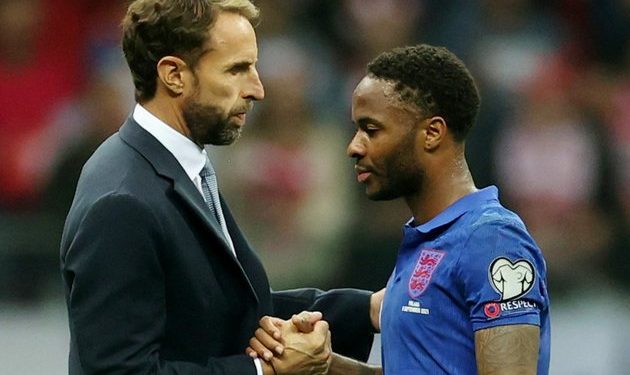England football manager Gareth Southgate and Manchester City striker Raheem Sterling have vowed to carry on backing the Black Lives Matter movement
The England national team will continue to make the pre-match gesture that has proved divisive at times in their country and beyond, with boss Gareth Southgate claiming his players did not realize the influence it would have.
The Three Lions have been one of the most high-profile teams to kneel before kick-off since the act of symbolism, which was invented by NFL quarterback Colin Kaepernick in 2016, became global in the aftermath of the killing of George Floyd in the US in May 2020.
Defiant Southgate said that the death of Floyd at the hands of police had inspired him to educate himself and find out more about Black Lives Matter (BLM).
Critics of the movement say it is political and even cynical, and there have been a string of controversial incidents in England over the taking of the knee, including booing from some supporters before a match involving Southgate’s side.
“At the very least, this had to be a team where we were united on how we saw it and we could send a message to young kids watching,” Southgate explained on Radio 4, speaking on a program that was being guest-edited by Sterling, one of his star players at Euro 2020 in the summer.
“I think the lads maybe didn’t realise how powerful that would be going into a tournament because they wanted to concentrate on the football.
“They want to be judged primarily on the football but what Raheem has done in this space, in particular, [is commendable].”
Southgate said Sterling’s decision to highlight two contrasting newspaper headlines in 2018 had caught his attention.
One of the headlines suggested that England midfielder Phil Foden, who was then 18 and is white, had spent around $2.7 million on a house for his mother.
The other, which concerned Tosin Adarabioyo, who was also a City youngster at the time and is black, said that Foden’s then-teammate had spent more than that amount on a “mansion on market”.
It added that Adarabioyo, who was born in England and is of Nigerian descent, had made his purchase “despite having never started a Premier League match” – wording that was interpreted by some as suggesting that he had not earned his property.
“I remember you put the two articles out on how Tosin had been reported on as a young player and a similar sort of story with Phil, and the difference,” Southgate told Sterling. “And it was clear the way those things had been reported [was different].
“So there were a lot of things that happened over the last few years, including the incident with George Floyd, which I think… educated me a lot, and I wanted to represent the players in the best way I could.”
Fellow England star Tyrone Mings publicly rebuked UK Home Secretary Priti Patel for calling the taking of the knee “gesture politics”, while Crystal Palace talisman Wilfried Zaha suggested the idea had lost its meaning when he became the first Premier League player to stop doing it and speak out critically against it.
“I think a lot of the time when racism comes up or something has happened, in football and in the majority of society, we tend to address it for that period – for that five days or that week – and then we brush it under the carpet and [pretend] things are all fine now,” three-time Premier League winner Sterling told his international boss.
“When the next scenario happens, that’s when we go again… players who have been in those scenarios facing some of that racist abuse, on a whole, just want to keep highlighting that.
“Yes, there have been times that we’ve sat down and said, ‘Is the message still powerful?’, and we’ve said ‘yes’ – and as a group and as a collective, we’ve tried to keep that going.”
(RT.com)






